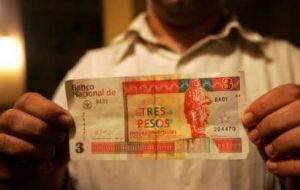MercoPress. South Atlantic News Agency
Cuba devalues currency 8% to boost exports and imports substitution process
 Most Cubans are paid in ordinary pesos equivalent to 4 US cents
Most Cubans are paid in ordinary pesos equivalent to 4 US cents Cuba devalued its convertible peso by 8% Monday to the level of parity with the US dollar as part of efforts to boost the island's flagging economy, the central bank said. Use of the convertible peso is limited to tourists and other foreigners, for Cubans who receive remittances from abroad and for export activity
This means that the Cuban Convertible peso drops from 1.08 to parity with the US dollar. The measure “will favour the establishment of more propitious conditions” in the country’s foreign financial relations, the bank said in a statement published in official media.
Central bank economists expect the change to act as “a stimulus to export activity and to the import substitution process”.
The bank said it will continue to charge a 10% commission on purchases of CUC with dollars, citing transaction “costs and risks” arising from Washington’s 48-year-old “irrational and unjust” economic embargo against Communist-ruled Cuba.
In addition, the decision will not alter the exchange rate between the CUC and the ordinary Peso, worth less than 4 US cents and the currency in which the vast majority of Cubans are paid salaries that average about 17 US dollars a month.
Employees of foreign-owned firms receive some remuneration in CUC, and people who receive remittances in dollars from relatives in the United States can exchange their greenbacks for CUC.
The CUC was created at parity with the US dollar in 1994, when the Cuban government authorized the circulation of the U.S. currency on the island. The CUC parity with the dollar was maintained until 2005, when Cuban authorities decided to boost the convertible peso by 8% against the greenback.
The central bank has now decided to return to the original parity because the earlier exchange rate “does not correspond to the country’s economic needs in the current conditions”.




Top Comments
Disclaimer & comment rulesCommenting for this story is now closed.
If you have a Facebook account, become a fan and comment on our Facebook Page!